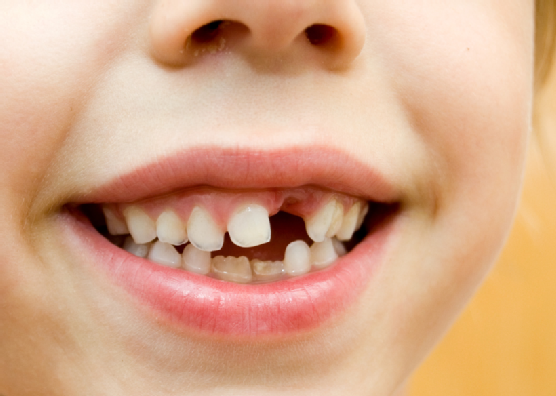It is no surprise to anyone that some people have more naturally straight teeth compared to others who have a crooked smile. But have you ever thought to yourself, what causes this discrepancy? Is it purely genetics or something more? What can do you do to fix your crooked teeth?
Interestingly enough, many of the reasons people think incorrect tooth development occurs is not actually the case. Most often teeth are an inherited trait just like eye color or height. Simply put, some mouths are not large enough to accommodate the secondary tooth set, which leads to a crowded formation and shifting to occur. Also, if baby teeth fall out too soon or too late it can cause crooked formations.
However, research shows that although hereditary factors play a large role in problems such as a misaligned jaw structure or crowded teeth, there are other sources known as incorrect myofunctional habits. These habits include mouth breathing, tongue thrusting, reverse swallowing and thumb sucking. Also, allergies and asthma contribute as well. Especially for young infants and children, allergies with nasal obstructions cause them to open their mouths, lower their tongue and breathe heavily. It may be a necessary posture at the time, but this becomes a routine and affects their jaw structure later on.
An important implication of these habits is that since they are an underlying root cause, their continuation will inhibit any real correction of teeth or jaw structure, even with braces. This is why once braces are removed, teeth can become crowded or misaligned again, hence the need for life-long retainers.
There are many problems associated with crooked teeth that make daily activities more difficult such as eating or speaking. For example, they leave the mouth vulnerable to injury because they do not provide sufficient support necessary for the jaw and muscles. In addition, tooth pain, increased tooth sensitivity, tooth decay or gingivitis can occur due to crooked teeth conditions.
There are also superstitions that say that consuming certain foods can lead to crooked teeth. For example, some suggest staying away from soft foods because it can affect teeth formation and deteriorate the strength of your jaw over time.
Taking Action
Having crooked teeth is not something anyone wants to deal with on a day-to-day basis. It can feel discouraging and even lower self-esteem. In order to revert crooked teeth, orthodontic procedures and treatment is necessary.
To improve stability, function and health of teeth, orthodontics may recommend three options: retainers, braces or Invisalign. Retainers are used to maintain the results of orthodontic treatment. Braces are the most traditional and viable alternative for straightening teeth, as they are constructed from comfortable and eye-catching materials. Invisalign are plastic trays that are removable making eating and dental hygiene a breeze. They are preferred for straightening out teeth in a convenient and discrete manner. An additional option that doesn’t require a lengthy treatment time, but fulfills cosmetic imperfections, are porcelain veneers. These cover crooked teeth giving off a smooth, even and aligned appearance.
In Summation
Crooked teeth occur due to a variety of reasons and have long lasting effects and problems if not taken care of properly. Orthodontists who offer several corrective measures can only do so much if the individual persists with certain habits that cause teeth to reposition themselves, even after treatments. Teeth are a wonderful thing; so make sure you are taking care of them!
Written by Dr. Darren Wittenberger, the best orthodontist Columbia MO has to offer, and owner of his own practice, Advance Orthodontics. Dr. Wittenberger enjoys sharing his expertise to ensure people can maintain the healthiest, straightest teeth possible!
